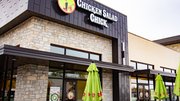Article
Optimizing your restaurant ROI through sustainability
This special report demonstrates how a restaurant can take care of business while caring for the environment.

December 27, 2009
Whether they are purchasing wind credits, recycling fryer oil or buying local produce, restaurant operators pursuing a healthy future are putting practices in place to benefit their employees, consumers and the planet. They are at the forefront of a principle-driven way of doing business that they predict will have a positive, long-lasting impact on the environment and their businesses.
As they follow sustainable practices, these operators also are tracking the financial benefits of their efforts.
"Most of these initiatives are going to return green to the bottom line. In other words, they are going to save money. They have a cost upfront, but they are going to save money long term," said Darren Tristano, executive vice president of Technomic Inc., a Chicago-based restaurant consulting firm.
The checklist provided in this special report outlines what companies are doing to promote sustainability and social responsibility. Operators who follow these practices want to build brands that customers recognize for their quality products and commitment to the environment.
Operators that take pride in treating people and the planet well believe these practices will ensure that their companies will flourish for years to come. One such operator is fast-casual chain Pizza Fusion.
"We were born a socially responsible company, and it's something we're very passionate about. It's the right thing to do," said Eric Haley, vice president of communications for Pizza Fusion in Fort Lauderdale, Fla.
The company's growth speaks to its success. Since its founding in 2006, the chain has opened 16 restaurants and plans to open 75 more in the next few years.
Reduce resource consumption
Recycling makes sense for companies that want to protect the planet, connect with customers and reduce costs. Operators that recycle are meeting the needs of today's environmentally conscious consumers and are a step ahead when it comes to welcoming future generations of diners.
"The generations coming up are completely recycling-focused. Restaurants that want their brand to be relevant for the next generation are recycling," Tristano said.
Burgerville, a QSR based in Portland, Ore., recycles at all of its 39 restaurants and does composting at some.
"At 22 of our restaurants, we are doing composting in the back of the restaurant, and at four of them, we are composting in both the front and back of the restaurant," said Jack Graves, chief cultural officer for Burgerville.
Graves said his job is to be a steward of the com-pany's mission — "To Serve with Love" — and to track how well its sustainable practices are accepted by the community. Judging by customers' willing-ness to pitch in, composting is a hit.
"Guests like it so much that sometimes they even help us sort. There is a large contingent of people who see value in protecting the environment," Graves said.
Using recycled materials is one way that Ted's Montana Grill shows it values the environment. The company, which has 50 restaurants in 18 states, has a goal of being 99-percent plastic-free. The chain even uses paper straws in all its restaurants, Tristano noted. In addition, the menus are printed on 100-percent recycled paper, to-go cups are made of cornstarch that biodegrades in landfills in 50 days and soda is served in recyclable glass bottles.
Ted's is on the forefront of a trend that Tristano said he expects to grow in the restaurant industry.
"It's an example of how there is a shift away from Styrofoam and more use of recycled materials," Tristano said.
Click here to download this specil report.
 ChatGPT
ChatGPT Grok
Grok Perplexity
Perplexity Claude
Claude












